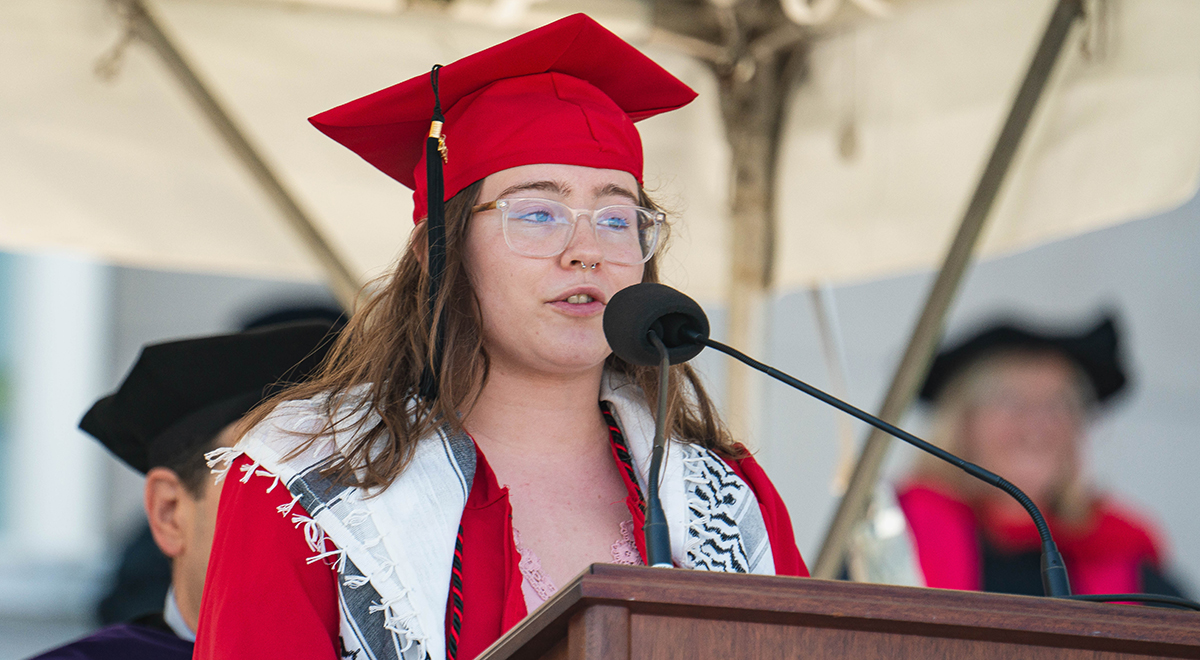Ruby Clarke ’24: “We Fight Because We Care, Because Wesleyan Matters to Us”

Ruby Clarke ’24, the Class of 2024 Commencement Speaker at Wesleyan’s 192nd Commencement ceremony, reflected on student protests at Wesleyan throughout the University’s history to demonstrate how student activism can be a radical act of love through resistance. Clarke also called for students to express love through learning, being curious, and listening to others.”We fight because we care, because Wesleyan matters to us. Wesleyan is not perfect, but that is what love and collective action is for: it bridges the gap between the imperfect nature of institutions and our current needs.”
Clarke, a College of Social Studies and American studies double major, came to Wesleyan from a small town in Marin County, California. They spent four years working on the Wesleyan Student Assembly’s Student Life Committee and they were also involved in many on-campus collective action movements. After graduation, Clarke plans to work with an organized group advocating for bus drivers in northwestern Connecticut. They will also develop curricula for K-12 students on collective action, with the hopes of getting it adopted by the state curriculum.
Clarke made the following remarks during Wesleyan’s 192nd Commencement Ceremony on May 26:
Wesleyan taught me to love. From purple crocuses in my front yard to midnight bicycles riding through Exley to the warm embrace of friends coming home after break: Wesleyan taught me to love.
Growing up in a town of 900 people with an eighth grade class of 18, the bond we shared was less that of classmates and more that of family—we had lived our entire lives together, the good and the bad, the memorable and the forgettable, for more than 10 whole years. Heading to Wesleyan, an order of magnitude larger than my high school, I was apprehensive: I was joining a community where I knew no one, moving across the country, leaving my mother, all in the middle of the COVID-19 pandemic. I was afraid of change and I was afraid of changing.
But I’ m a firm believer that the classroom brings out the best in us. Why? Because curiosity is a particular type of kindness. To be curious is to listen. It is to humble yourself by asking questions you cannot answer, in search of responses you might not understand. Driven by the desire to understand the world around you on its own terms, curiosity requires respect. To sit in wonder AND wonder. But the ultimate prerequisite for curiosity is care. The difference between mere questioning and earnest, yearning curiosity is caring. To care is to be kind. And what is kindness if not sharing your love with others?
When students like myself stand up in front of their peers with a microphone quite like this one, though not as loud, to fight for what is right and what is just and what is kind, we do so out of love. When Wesleyan’s Afro-American Society took over Fisk Hall in 1969, it was a radical act of love and resistance, demanding the care and curiosity of the University be extended to Black students. In 2000, when the United Student Labor Action Coalition conducted a 33-hour-long sit-in in the Office of Admission to secure better working conditions for contractors on campus, it was a radical act of resistance and love. And two years ago, when the Wesleyan Union of Student Employees held one of the first protests since COVID-19 and became the first voluntarily recognized undergraduate student union in history, it too was a radical act of love and resistance. We fight because we care, because Wesleyan matters to us. It’s not perfect, but that’s what love and collective action are for: they bridge the gap between the imperfect nature of an institution and our needs as students. Because if love only extends as far as perfection, it’s not love; it becomes appreciation. There is nothing radical about only loving perfection.
Know that you are loved and worthy of love. Know that the world around you is a distinctly better place with every single one of you in it, and that loving fiercely is a radical act in a world that so intensely commodifies every single one of our actions. What brings us together? Love and solidarity! A university does not lurk somewhere between a motto and a brochure. A university is a collection of earnest learners and caring individuals; it exists in the space between you and me.
And if my time here at Wesleyan has taught me anything, it has taught me to love.
Thank you.

